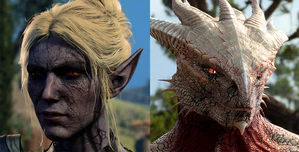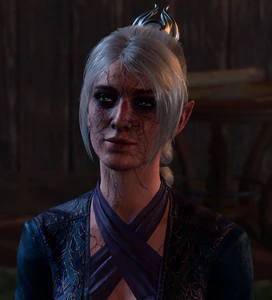Ad placeholder
Partial-illithid

A partial-illithid is a character who has undergone a transformation and become a partial mind flayer, gaining the passive Partial Ceremorphosis. Partial-illithids gain access to elite illithid powers, but also experience a physical change.
Becoming partial-illithid[edit section | visual editor]
After completing Act Two and travelling to the outskirts of Baldur's Gate, the party is attacked by Githyanki Monks upon long resting. After the fight, The Emperor offers the player character the Astral-Touched Tadpole.
The player character can use the astral tadpole immediately, however other characters may have to be Persuaded, except Minthara, who wants to use the tadpole, but must be spoken to for the option to become available. A character can then choose to open their mind to the tadpole (or eat it) to undergo partial ceremorphosis. If any character chooses to eat the tadpole, it is consumed and no longer available for others to use.
When being given the astral tadpole, the Wisdom DC to resist it is variable based on how many tadpoles the character has used. [verify] A character who has not used any tadpoles need not pass a skill check.
Partial-illithid powers[edit section | visual editor]
A partial-illithid gains access to the outer tier of elite illithid powers, which can now be unlocked with Mind Flayer Parasite Specimens:
They also immediately obtain the following powers (any regular tadpoles the character might have already spent to unlock these abilities will be refunded):
Gallery[edit section | visual editor]
-
Partial-Illithid Shadowheart
Notes[edit section | visual editor]
- During the partial ceremorphosis scene, some of the character's teeth may fall out. However, a full set of teeth can be seen in later scenes with the character.
- Non-party NPCs do not make any comments about transformed characters.
- Becoming partial-illithid changes only the character's appearance, access to illithid powers, and a small set of companion comments; it does not consequentially affect story choices.
- Partial Ceremorphosis is a permanent passive condition.
- The change in a character's appearance from this passive follows them into any disguise they may use.
- This passive can only be only removed by undergoing full Ceremorphosis.
























































